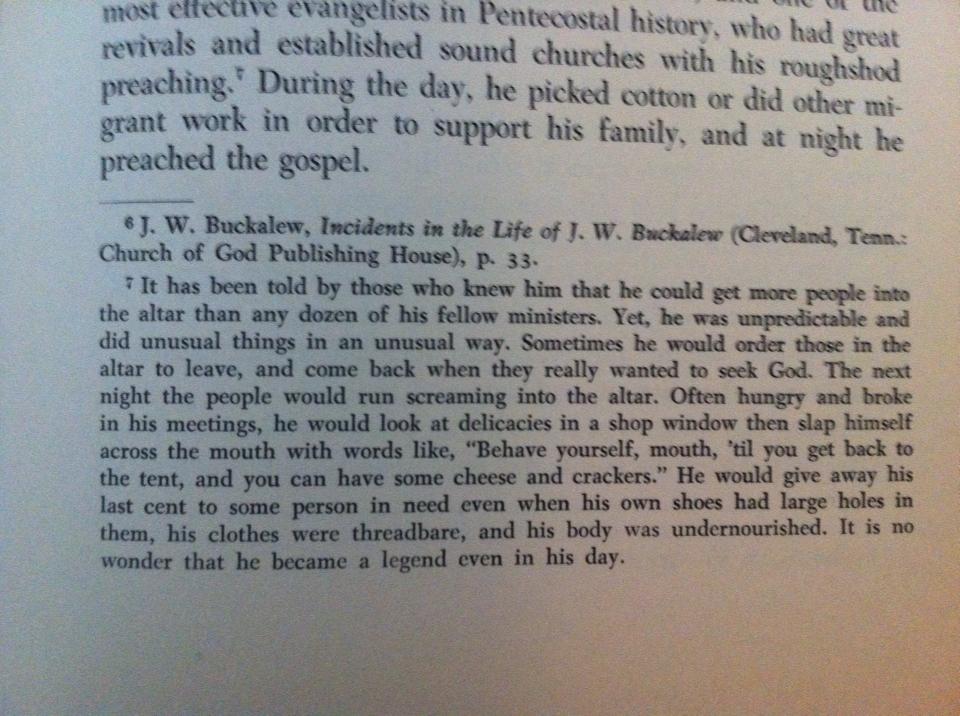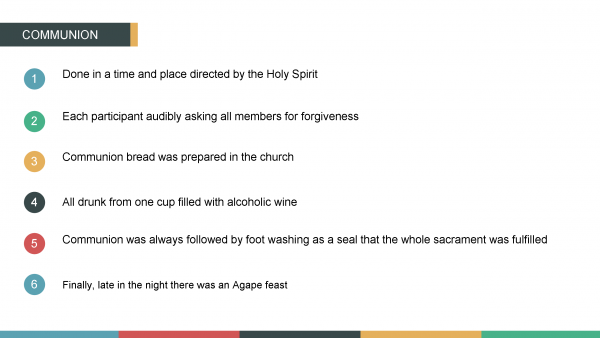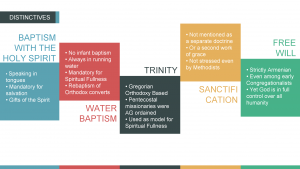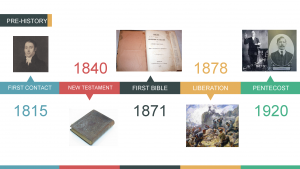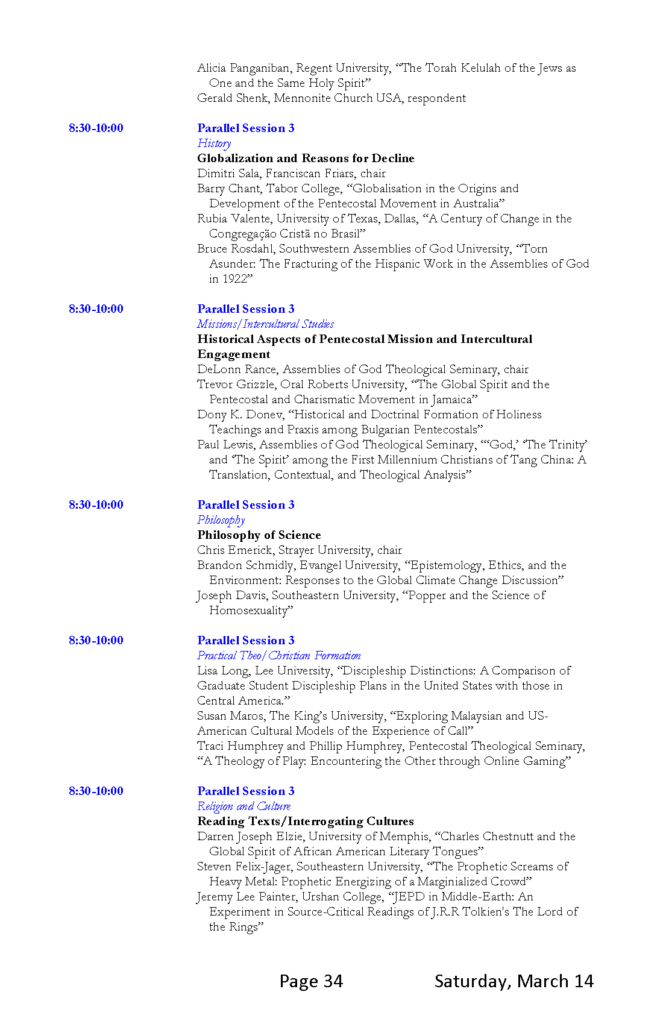Diamonds in the “Rough and Ready” (Pentecostal Series)
- Alive, alive! (A personal testimony)
- Church of God Primitivism
- Bulgarian Church of God
- J.W. Buckalew
- WAR ON THE SAINTS: Revival Dawn and the Baptism of the Spirit
- How Jezebel Killed One of the Greatest Revivals Ever
- Pentecostal Primitivism Preserved
- Why revival came? by Dr. Charles Conn
- Azusa Street Sermons
- The FORGOTTEN ROOTS OF THE AZUSA STREET REVIVAL
- First person to speak in tongues in the Assemblies of God was William Jethro Walthall of the Holiness Baptist Churches of Southwestern Arkansas
- The Work of the Spirit in Rhode Island (1874-75)
The FORGOTTEN ROOTS OF THE AZUSA STREET REVIVAL
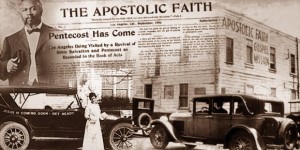 by HAROLD HUNTER, PH.D.
by HAROLD HUNTER, PH.D.
Writing during the glow of the Azusa Street revival, V.P. Simmons claimed to have 42 years of personal exposure to those who spoke in tongues. Published in 1907 by Bridegroom’s Messenger and circulated as a tract, Simmons chronicled the history of Spirit baptism from Irenaeus (2nd century) up to and including a group from New England whom he personally observed manifesting tongues-speech as they continually partook of a spiritual baptism.1 Identified as Gift People or Gift Adventists, they were widely known for their involvement with spectacular charisms.Early Pentecostal periodicals reported that tongues-speech was known among these groups since the latter part of the 19th century. Some groups were said to number in the thousands.
William H. Doughty, who, by 1855, had spoken in tongues while in Maine, was counted among that number. Elder Doughty moved to Providence, Rhode Island, in 1873 and assumed leadership among those exercising the gifts of the Spirit.3 Doughty’s mantle was passed on to Elder R.B. Swan who, reacting to the Azusa Street revival, wrote a letter explaining that the Gift People in Rhode Island had experienced speaking in tongues as early as 1874–75. (See “The Work of the Spirit in Rhode Island.”) B.F. Lawrence followed Swan’s letter describing an independent account of a woman who spoke in tongues in New York, perhaps prior to 1874, a result of her contact with the Gift People.4 (See “A Wonderful Healing Among The Gift People.”)
Stanley H. Frodsham quotes Pastor Swan’s claim to having spoken in tongues in 1875. Swan speaks of great crowds drawn from five states and specifically mentions his wife — along with Amanda Doughty and an invalid hunchback who was instantly healed — among those who spoke in tongues during this time.
Simmons said that Swan’s group adopted the name “The Latter Rain” after the advent of the Pentecostal movement. Their activities extended throughout New England states, especially Rhode Island, New Hampshire, Massachusetts, Vermont, and Connecticut, with the 1910 Latter Rain Convention held October 14–16 in Quakertown, Connecticut. Frank Bartleman frequently referred to joint speaking engagements with Swan, specifically recounting a 1907 tour that included a convention in Providence, Rhode Island, where he spoke 18 times.
Previously overlooked in related investigations is whether the Doughty family counted among the Gift People overlap with the Doughty who traveled with Frank Sandford. Lawrence attests that Swan’s circle included William H. Doughty’s daughter-in-law, Amanda Doughty, and her unnamed husband, an elder in the Providence congregation.8 Simmons says that William H. Doughty had two sons, the oldest, Frank, who was ordained. Could the unnamed brother of Frank be Edward Doughty, who at the end of the 19th century was part of Sandford’s entourage? So it seems.
Most of the groups named here have similar stories. For example, among the Fire-Baptized Holiness ranks was Daniel Awrey who had spoken in tongues in 1890 in Ohio. His residence was in Beniah, Tennessee, where an outbreak of speaking in tongues was reported in 1899. F.M. Britton wrote about people speaking in tongues in his Fire-Baptized revivals that predated the Azusa Street revival. Also, a revival in Cherokee County, North Carolina, in 1896, that gave the Church of God (Cleveland, Tennessee) many of its early leaders reported an outburst of speaking in tongues among several of the adherents. Given the above accounts, there is some debate as to whether Parham first heard speaking in tongues while at Sandford’s Shiloh in Maine or while he was among Fire-Baptized enthusiasts.
THE FOLLOWING ARE THE CATHOLIC LEADERSHIP OR GROUPS RECORDED TO HAVE SPOKEN IN TONGUES:
• ST. HILDEGARD (1098-1179)
• ANTHONY OF PADUA (1195-1231)
• FRANCISCANS (1200S)
• ANGE CLARENUS (1300)
• VINCENT FERRER (1350-1419)
• STEPHEN, MISSIONARY TO GEORGIA (1400S)
• ST. COLETTE (1447)
• LOUIS BERTRAND (1526-1581)
• THE JANSENISTS (1600)
• JEANNE OF THE CROSS (1450S)
• FRANCIS XAVIER (1506-1552)
SHERRILL’S BOOK ALSO LISTS SOME INDIVIDUALS FROM THE 19TH CENTURY WHO REPORT TONGUES-SPEAKING OCCURRING:
- 1855 V.P. SIMMONS
- ROBERT BOYD (DURING MOODY’S MEETINGS)
- 1875 R.B. SWAN
- 1979 W. JETHRO WALTHALL
- MARIA GERBER
MORE BOOKS to STUDY:
- “THEY SPEAK WITH OTHER TONGUES” BY JOHN L. SHERRILL
- “GLOSSOLALIA: TONGUE SPEAKING IN BIBLICAL, HISTORICAL, AND “PSYCHOLOGICAL PERSPECTIVE” BY FRANK E. STAGG
- “SPEAKING IN TONGUES: A GUIDE” BY MILLS
- “SPEAKING WITH TONGUES: HISTORICALLY AND PSYCHOLOGICALLY CONSIDERED” BY GEORGE CUTTEN.
First person to speak in tongues in the Assemblies of God was William Jethro Walthall of the Holiness Baptist Churches of Southwestern Arkansas
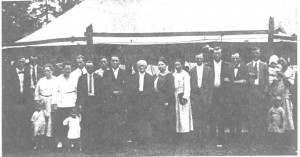 By Glenn Gohr
By Glenn Gohr
A/G Heritage, Fall 1992
Although the modern Pentecostal movement relates its beginnings to Charles Parham, who formulated classical Pentecostal theology at his Bible school in Topeka at the turn of the century, throughout history, from apostolic times to the present, there have been certain religious groups and isolated cases of individuals who have experienced tongues-speaking and spiritual gifts.
William Jethro Walthall, who founded the Holiness Baptist Churches of Southwestern Arkansas, a group which later merged with the Assemblies of God, is an important figure who received his baptism in the Spirit prior to Parham’s launching of Pentecostalism in 1901.
Walthall’s Spirit baptism, which occurred 113 years ago, is one of the earliest documented cases of speaking in tongues in North America. Earlier instances of tongues-speaking have been reported among the Shakers, the Holiness Movement, the “Gift People” or “Gift Adventists” in New England, and others. It is very possible that Walthall is the earliest person to have received the baptism in the Holy Spirit and who later joined the Assemblies of God.
William Jethro Walthall was born in Nevada County, Arkansas, March 9, 1858, the son of Charles Featherston Walthall and Mary Jemima Meador. His father died in 1863 at Rock Island, Illinois, as a prisoner in the Civil War, and his mother died 2 years later. Orphaned at age 7, he was reared by his widowed grandmother. However he had no Christian upbringing, so it was not until 1877 that he was confronted with the claims of the Gospel. That happened when he attended an old-time Methodist meeting and conviction gripped his heart, resulting in his conversion at age 19. Two years later, on August 3, 1879, he was married to his first wife, Melissa P. “Missy” Beavers, who bore him two children, Millard and Ibber Mae. After Melissa passed away, he married Hattie Vaughn on March 24, 1915.
While a young Christian, Walthall had a yearning for more of the workings of God in his life. He earnestly began to seek for a fullness of power to witness and better serve the Lord. This spiritual hunger led him to carefully study the Book of Acts and other scriptures. There he found recorded an enduement with power of the Holy Ghost which had accompanied the Early Church. He wanted this same experience in his life.
During a season of fervent prayer, he received a mighty infilling of the Spirit on September 3, 1879. Since he had never heard of the baptism of the Holy Spirit, he did not receive his Baptism through any prescribed theory or method.
Until that time all he knew about the Holy Spirit came from the teachings of the Methodists and Baptists. But this was something new. His experience came about in answer to prayer and through his own study of the Word of God. From the outset he understood that his experience corresponded with the records given in the Book of Acts.
In his testimony, Walthall describes his infilling by saying, “I was carried out of myself for the time being.” From the time of his Baptism, he testified that he often felt the strong anointing power of God. At times he would fall under the power of God when the Spirit came upon him. He also spoke in tongues as the Spirit directed.
For two years, during which time the Holy Ghost would often fall on me, I walked with God. Sometimes while in service and sometimes when alone in prayer I would fall prostrate under His mighty power. While under this power my tongue seemed to be tied in the center and loosed at both ends. I knew nothing of the Bible teaching on the Baptism or speaking with tongues, and thought nothing of what had happened in my experience.
Walthall was ordained by the Missionary Baptist Church on May 29, 1887, and served several congregations in Southwest Arkansas. He was active in various associational committees including foreign missions and temperance. In 1891 he was pastor of Piney Grove Church at Boughton, Arkansas, which was a part of the Red River Baptist Association of the Southern Baptist Convention. In fact, the annual associational meeting was held that year at Walthall’s church. The next year he was pastoring two churches at Bluff City and Prescott. From 1894-1895 he was pastoring at Stephens. The last Baptist church he pastored was at Buena Vista. Because of the prevalent view of the Holy Spirit held by Baptists, Methodists, and other mainline churches, Walthall had some reservations about his experience, as he shares in his testimony:
The ordinary Methodist and Baptist teaching was all that I knew, and, of course, that served to diminish my experience and to paralyze my faith rather than build me up. In the meantime, I began preaching a work to which I was called when the blessed Spirit filled me. I always felt that there was a lost chord in the Gospel ministry. My own ministry never measured up to my ideal, nor did the teaching of my church (Baptist) measure up to my experience.
Then in 1895 Walthall came into contact with the Holiness revival. Its emphasis on the work of the Holy Spirit impressed him. Its teachings approximated his ideal more nearly than anything else, but he never fully ascribed to the Holiness theology. He could not accept its theory of sanctification; nor could he accept its abridgement of the supernatural. Even so, the Holiness revival opened him up to a larger sphere of ministry, This in turn gave him the encouragement he needed to preach the full gospel message as he understood it from the Scriptures. As he began to preach a full gospel message, the Baptist leaders excluded him from his church and he was ostracized from the Baptist ministry in 1896. He continued preaching on his own.
After my new vision of the Word of truth, and my expulsion from the Baptist fellowship and ministry, I went alone with a new zeal in an independent, plodding ministry, with church and school houses closed against me. I was looked upon with suspicion, as unbalanced but was so animated by the divine presence that it seemed at times as if terrestrial bearing was almost lost. Baptist minister, J. C, Kelly, and other Baptists who became disfellowshipped because of their beliefs in entire sanctification and the work of the Holy Spirit.
He was soon followed by another Baptist minister, J. C. Kelly, and other Baptists who became disfellowshipped because of their beliefs in entire sanctification and the work of the Holy Spirit.
The Practice of Corporate Holiness within the Communion Service of Bulgarian Pentecostals
by Dony K. Donev, D.Min.
Historical and Doctrinal Formation of Holiness Teachings and Praxis among Bulgarian Pentecostals (Research presentation prepared for the Society of Pentecostal Studies, Seattle, 2013 – Lakeland, 2015, thesis in partial fulfillment of the degree of D. Phil., Trinity College)
Pentecostal identity was corporately practiced and celebrated within the fellowship of believers through the partaking of Holy Communion. We have otherwise extensively described the Communion service among Bulgaria’s conservatives in Theology of the Persecuted Church (Part 1: Lord’s Supper https://cupandcross.com/theology-of-the-persecuted-church/). Therefore, here we offer just a brief overview of its main characteristics.
- It was done in a time and place directed by the Holy Spirit
- If some did not have water baptism they were taken to a close by river to be baptized while the rest of the church prayed
- Upon returning, if some did not have yet the baptism with the Holy Spirit, the church would pray until all were baptized
- It began with each participant audibly asking all members for forgiveness
- they would also audible respond with the words: WE FORGIVE YOU and may GOD also forgive you
- The communion bread was prepared on the spot baked by women whose names were also reveled in prayer
- All drank from one cup, which strangely for their strict practice of abstinence from alcohol, was filled with alcoholic wine
- Communion was served only to those who had the fullness of the Spirit, and had just requested and were given forgiveness
- The presbyter would quote Jude 20 to each partaking believer thus directing them to audibly speak in tongues before they could participate in communion
- Interpretation often followed to confirm the spiritual stand of the believer
- If there were any leftovers, the Communion elements were served again until all was used
- Communion was incomplete without foot washing as a seal that the whole sacrament was fulfilled.
Sanctification and Personal Holiness among Early Bulgarian Pentecostals
Historical and Doctrinal Formation of Holiness Teachings and Praxis among Bulgarian Pentecostals (Research presentation prepared for the Society of Pentecostal Studies, Seattle, 2013 – Lakeland, 2015, thesis in partial fulfillment of the degree of D. Phil., Trinity College)
With all said about the importance of Spirit baptism and the importance of the Trinity in the Pentecostal experience of the believer, it comes as a great surprise that sanctification was never mentioned as a specific doctrine among early Bulgarian Pentecostals. Voronaev’s teaching included: (1) salvation through new birth, (2) baptism with the Holy Spirit, (3) healing and (4) the second return of Christ. Sanctification was never specifically mentioned as a separate doctrine.
To this day, sanctification is not an official doctrine for the Evangelical Methodist Episcopal Church of Bulgaria. In 1928, Bulgaria’s Pentecostal Union also included holiness as number ten in their first bylaws. Sanctification was not defined as a second work of grace, but as a “continuous life of holiness”. With the enormous theological Methodist influence, it is astounding that the doctrine of sanctification was never taught as a separate work of grace. Even when after Pentecostalism spread in Bulgaria, it was not included in the tri-fold formula for “spiritual fullness” of the believer.
Nevertheless, the search for a deeper spirituality was always there. When liberal theology entered Bulgaria in the beginning of the 20th century, the more conservative believers were forced to separate from the larger city congregations into home services and cottage meetings.
These small communities were enclosed, but easily identified by their extreme personal asceticism. There was no use of instruments in worship, no denominational structure and a distinct social disengagement from the world. Men shaved their heads completely and grew long mustaches. They wore no dress ties, because they pointed downward toward hell. Women wore head coverings as a sign for the angels both within and outside church services. Even the mother of Bulgaria’s Pentecostalism, Olga Zaplishny, who was college educated and spent years in the United States wore a head cover and enforced all ladies to follow her example.
Doctrine of the Trinity among Early Bulgarian Pentecostals
Historical and Doctrinal Formation of Holiness Teachings and Praxis among Bulgarian Pentecostals (Research presentation prepared for the Society of Pentecostal Studies, Seattle, 2013 – Lakeland, 2015, thesis in partial fulfillment of the degree of D. Phil., Trinity College)
The Doctrine of the Trinity was not foreign for the Eastern Orthodox mindset of the first Bulgarian Pentecostals. They grew in a spiritual context where eastern pneumotology historically promoted the graduate process of theism development, with the Spirit being involved in both original creation of the world and the new-birth of the believer. For them, God’s work did not end there, but continued throughout a process of personal sanctification of the believer. This gradual process would have the same triune characteristics as of the triune God, providing the believer an experience with each person of the Trinity.
The historically inherited value of the Trinity is evident in the Bylaws of the Pentecostal Union where it was listed second only to the verbal inspiration of the Bible. As ordained Assemblies of God ministers, both Zaplishny and Voronaev subscribed to the 1916 Statement of Fundamental Truths, which resolved the “oneness controversy” and because of that were unquestionably Trinitarian. All documents from the time period prove that the movement they started in Eastern Europe followed their theological teachings.
Historical and Doctrinal Formation of Holiness Teachings and Praxis among Bulgarian Pentecostals
by Dony K. Donev, D.Min.
Historical and Doctrinal Formation of Holiness Teachings and Praxis among Bulgarian Pentecostals (Research presentation prepared for the Society of Pentecostal Studies, Seattle, 2013 – Lakeland, 2015, thesis in partial fulfillment of the degree of D. Phil., Trinity College)
Protestant work in Bulgaria began in 1815 when agents of British and Foreign Bible Society, Robert Pinkerton (1780-1859) and Benjamin Barker (d.1859), initiated a search for Bible translators in the spoken Bulgarian vernacular. As a result a new translation of the New Testament in Bulgaria was published in 1840 and the whole Bible in 1871.
By the liberation of Bulgaria from Turkish Yoke in 1878 Protestantism was well established in Bulgaria. Graduates from Protestant Robert’s College became prominent politicians in the new Bulgarian state. When the first Pentecostal missionaries arrived in 1920, they found a century old protestant tradition in Bulgaria.
Presenting at the Society for Pentecostal Studies in Southeastern University on “Historical and Doctrinal Formation of Holiness Teachings and Praxis among Bulgarian Pentecostals” (Part 2)
January 25, 2015 by Cup&Cross
Filed under News, Publication, Research
Presenting at the Society for Pentecostal Studies in Southeastern University on “Historical and Doctrinal Formation of Holiness Teachings and Praxis among Bulgarian Pentecostals” (Part 2)
Online Pentecostal Academic Journals
Asian Journal of Pentecostal Studies (AJPS) – associated with the Asia Pacific Theological Seminary in the Philippines (Assemblies of God Philippines) – volumes from 1998-present – FREE ONLINE
Australasian Pentecostal Studies (APS) – 1999-present – FREE ONLINE
Canadian Journal of Pentecostal-Charismatic Christianity – 2010-present – FREE ONLINE
Cyberjournal for Pentecostal-Charismatic Research – 1997-2013 – FREE ONLINE
Encounter: Journal for Pentecostal Ministry – associated with the Assemblies of God Theological Seminary – volumes from 2004-present – FREE ONLINE
Journal of the European Pentecostal Theological Association (JEPTA) – associated with the European Pentecostal Theological Association – volumes from 1981-present – FREE ONLINE through 2009 / Members access to 2010-present
Journal for Pentecostal Theology (JPT) – volumes from 1992-present – Members access only
The Pentecostal Educator – associated with the World Alliance for Pentecostal Theological Education – volumes 2014-present – FREE ONLINE [FORTHCOMING]
PentecoStudies: Online Journal for the Interdisciplinary Study of Pentecostal and Charismatic Movements – 2004-present – subscription
Pneuma: Journal of the Society for Pentecostal Studies – volumes from 1979-present – Members access only
PneumAfrica: The Online Journal of African Pentecostal Christianity – associated with the Association for Pentecostal Theological Education in Africa – volumes from 2013-present – FREE ONLINE
Pneuma Review – volumes from 1998-present – FREE ONLINE
I have intentionally not included the more pastoral and popular publications: Paraclete (1967-1995), Enrichment Journal (1995-present), or Enrich: A Journal for Pentecostal Ministry.
[CURRENT ON JULY 19, 2014]
Bulgarian Study New Testament
Comments Off on Bulgarian Study New Testament
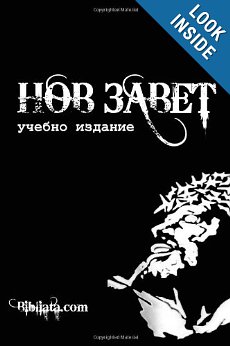 We are truly blessed to introduce for the first time the Bulgarian Study New Testament. The text is specifically designed and printed for Bulgarian immigrant churches outside of Bulgaria and specifically for the Goodwin need of Bibles, study guides and leadership literature among the Bulgarian Churches in North America. This first edition contains:
We are truly blessed to introduce for the first time the Bulgarian Study New Testament. The text is specifically designed and printed for Bulgarian immigrant churches outside of Bulgaria and specifically for the Goodwin need of Bibles, study guides and leadership literature among the Bulgarian Churches in North America. This first edition contains:
- Revised protestant Bible History of the New Testament texts
- The Story of the Bulgarian Bible
- Harmony of the Gospels
- Prologue to each book
- How can I be saved?
- What the Bible says about…
- Holy Spirit in the life of the believer
- Prayer Devotions
- Praise and Worship Lessons
- Role of the Church in the world
- Theology in contrasts
- Names and titles of Jesus Christ
- Messianic Prophecies Fulfilled
- The miracles of Jesus
- The proverbs of the Lord
- Model and use of the Tabernacle
- Maps of Biblical places
- Plan of the Last days and the Book of Revelation


